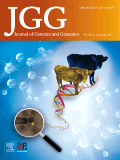
BIOCHEMICAL GENETICS
Scope & Guideline
Innovating the Understanding of Genetic Mechanisms
Introduction
Aims and Scopes
- Cancer Genomics and Epigenetics:
The journal frequently publishes studies exploring genetic variations, gene expression, and epigenetic modifications associated with various cancers. This includes research on biomarkers for diagnosis, prognosis, and therapeutic targets. - Molecular Mechanisms of Disease:
Research focusing on the molecular pathways involved in disease processes, including genetic, epigenetic, and environmental factors that contribute to conditions such as diabetes, cardiovascular diseases, and neurodegenerative disorders. - MicroRNA and Long Non-Coding RNA Functions:
A significant portion of the research is dedicated to understanding the roles of microRNAs and long non-coding RNAs in gene regulation, cancer progression, and other critical biological processes. - Genetic Diversity and Population Genetics:
The journal also emphasizes studies on genetic diversity, population structure, and the implications of genetic variations in different populations, particularly in relation to health and disease susceptibility. - Bioinformatics and Computational Biology:
There is a strong focus on bioinformatics approaches to analyze genetic data, identify potential biomarkers, and understand complex genetic interactions and regulatory networks.
Trending and Emerging
- Machine Learning and Artificial Intelligence in Genetics:
There is an increasing trend towards employing machine learning and AI techniques for analyzing genetic data, predicting disease outcomes, and identifying novel biomarkers, enhancing the precision of genetic studies. - Cuproptosis and Ferroptosis Research:
Emerging studies on cell death mechanisms, particularly cuproptosis and ferroptosis, are gaining attention for their implications in cancer treatment and understanding cellular stress responses. - Immune-Related Genetic Studies:
Research focusing on the genetic basis of immune responses, particularly in the context of cancer immunotherapy and autoimmune diseases, is becoming more prominent, highlighting the interplay between genetics and immunology. - Long Non-Coding RNAs and Circular RNAs:
The exploration of long non-coding RNAs and circular RNAs in gene regulation and their roles in various diseases is a rapidly growing area, reflecting a shift towards understanding the complexities of non-coding RNA functions. - Environmental and Epigenetic Influences on Genetics:
Studies examining how environmental factors affect gene expression and contribute to disease susceptibility are increasingly prevalent, emphasizing the importance of epigenetics in genetic research.
Declining or Waning
- Traditional Genetic Mapping Studies:
There has been a noticeable decline in papers focusing solely on traditional genetic mapping techniques, as newer methodologies such as genome-wide association studies (GWAS) and next-generation sequencing have gained prominence. - Basic Biochemical Studies Without Genetic Context:
Research that focuses purely on biochemical processes without a genetic or genomic context is becoming less common, as the field increasingly integrates molecular genetics with biochemistry. - Single Gene Studies:
Studies that concentrate on the effects of single genes on phenotypes are being overshadowed by more comprehensive approaches that consider gene networks, epigenetics, and environmental interactions.
Similar Journals

MOLECULAR GENETICS AND GENOMICS
Unraveling the Complexities of Life at the Molecular LevelMOLECULAR GENETICS AND GENOMICS is a distinguished journal published by SPRINGER HEIDELBERG that serves as a pivotal platform for the communication of cutting-edge research and developments in the fields of genetics, molecular biology, and medicine. With an ISSN of 1617-4615 and an E-ISSN of 1617-4623, this journal has established itself since its inception in 1994 as a significant resource for researchers aiming to explore the complexities of genetic interactions and their implications in various biological systems. The journal is indexed in Scopus, with respectable rankings in the Genetics, Molecular Biology, and Biochemistry categories, showcasing its position within the academic community. It is categorized in the 2023 rankings as Q3 in Genetics, Q2 in Medicine (miscellaneous), and Q3 in Molecular Biology, indicating its relevance and quality in the scientific discourse. The journal also promotes open access, ensuring that researchers and professionals can easily share and advance knowledge in the rapidly evolving disciplines of molecular genetics and genomics. As the journal continues to bridge the gap between experimental and theoretical research, it presents a vital space for innovation, fostering collaborations and scholarly exchange among its readership.

Journal of Genetics and Genomics
Unraveling the Complexities of Genomic ScienceThe Journal of Genetics and Genomics, published by SCIENCE PRESS in China, stands as a significant contributor to the fields of Genetics and Molecular Biology. With an ISSN of 1673-8527 and E-ISSN 1873-5533, this esteemed journal has achieved a remarkable reputation, holding a prestigious Q1 ranking in both Genetics and Molecular Biology as of 2023. This journal not only showcases pioneering research but also fosters vital discussions on contemporary challenges and innovations within genomic sciences. As part of its commitment to facilitating scientific advancement, the journal encompasses a range of research articles, reviews, and short communications, all aiming to illuminate the complexities of genetic structures and functions from 2007 to 2024. Researchers, professionals, and students alike are encouraged to engage with its content, which ranks favorably in Scopus—placing it within the top tier of its categories. Join the community of academic excellence and explore the latest findings that shape our understanding of genomics.

NUCLEOSIDES NUCLEOTIDES & NUCLEIC ACIDS
Charting New Territories in Genetic InquiryNUCLEOSIDES NUCLEOTIDES & NUCLEIC ACIDS is a vital academic journal published by Taylor & Francis Inc, dedicated to the intricate and evolving domains of biochemistry, genetics, and molecular medicine. With an ISSN of 1525-7770 and E-ISSN of 1532-2335, this journal aims to provide a comprehensive platform for the dissemination of research findings, reviews, and methodologies related to nucleosides, nucleotides, and nucleic acids. As a research journal thriving since its inception in 2000, it reflects a diverse spectrum of studies crucial for advancing knowledge in biochemistry (ranked Q4) and genetics (Q4), while also achieving Q3 status in medicine (miscellaneous). Despite its current standing in the quartiles and Scopus rankings indicative of an emergent trajectory, the journal retains significant relevance for those delving into interdisciplinary research that intersects these fields. Researchers, professionals, and students alike can explore a plethora of original research articles, thought-provoking reviews, and updates on pioneering advances that shape our understanding of molecular biology. With its unwavering commitment to scholarly excellence, NUCLEOSIDES NUCLEOTIDES & NUCLEIC ACIDS continues to be an essential resource for those aiming to contribute to and stay informed about this pivotal area of scientific inquiry.

Human Genomics
Empowering Research in Health and DiseaseHuman Genomics, published by BMC, is a leading open-access journal dedicated to advancing the field of genomics and its applications in health and disease. Since its inception in 2003, the journal has provided a vital platform for researchers to disseminate groundbreaking findings related to genetic research, contributing significantly to areas such as Drug Discovery, Genetics, Molecular Biology, and Molecular Medicine, as reflected in its Q1 and Q2 quartile rankings throughout 2023. With an ISSN of 1473-9542 and an E-ISSN of 1479-7364, Human Genomics not only delivers high-quality, peer-reviewed research but also ensures accessibility to a broader audience, empowering professionals, students, and academics to stay at the forefront of genomic science. Through its rigorous editorial standards and impactful publications, the journal fosters a collaborative environment for innovative research across the globe from its base in the United Kingdom. By promoting open access since its launch, Human Genomics continues to enhance the visibility and impact of genetic studies, making it an essential resource for anyone involved in the rapidly evolving field of human genomics.

Vavilovskii Zhurnal Genetiki i Selektsii
Connecting Theory and Practice in Genetic ResearchVavilovskii Zhurnal Genetiki i Selektsii, with ISSN 2500-0462 and E-ISSN 2500-3259, is a distinguished open-access journal published by the Russian Academy of Sciences, Institute of Cytology and Genetics. Since transitioning to open access in 2013, the journal has been dedicated to advancing research and discourse in the fields of genetics and selection, particularly within agricultural and biological sciences. With a current ranking of Q2 in Agricultural and Biological Sciences and Q3 in Biochemistry, Genetics and Molecular Biology according to Scopus, it serves as a pivotal platform for researchers, professionals, and students to disseminate their findings and collaborate on innovative ideas. The journal, housed in the vibrant academic environment of Novosibirsk, Russia, publishes a diverse range of articles that contribute to the ongoing evolution of genetic studies and practical applications in agriculture. Its commitment to quality and accessibility ensures it plays an essential role in the global scientific community, fostering knowledge that bridges theoretical research and practical implementation.

Non-Coding RNA
Innovating the Future of Genomic ResearchNon-Coding RNA is a prestigious open-access journal published by MDPI, based in Switzerland, dedicated to the significant and rapidly evolving field of non-coding RNA research. Established in 2015, this journal has quickly become an essential resource for researchers and professionals, showcasing innovative studies and breakthroughs related to the functions and mechanisms of non-coding RNAs in various biological processes. With an impressive Q1 ranking in Biochemistry and strong rankings in Genetics and Molecular Biology, Non-Coding RNA consistently reflects the highest standards of academic publishing. The journal provides comprehensive access options, granting researchers worldwide the ability to disseminate and access high-quality research without subscription barriers. As the landscape of genomics and molecular discoveries continues to expand, the journal aims to foster interdisciplinary exchanges and collaborations, making it a vital platform for advancing knowledge and innovation in this critical area of biological science.

GENETICS AND MOLECULAR RESEARCH
Unlocking the Secrets of Life at the Molecular LevelGENETICS AND MOLECULAR RESEARCH is a distinguished academic journal published by FUNPEC-EDITORA, focusing on the rapidly evolving fields of genetics and molecular biology. Since its inception in 2002, the journal has provided a platform for high-quality research and advancements that contribute to our understanding of genetic mechanisms and molecular interactions. With an impressive convergence period extending through 2024, this open-access journal presents vital insights while maintaining accessibility for researchers, professionals, and students alike. Though currently positioned in the Q4 quartile in Genetics, Medicine (Miscellaneous), and Molecular Biology as per the latest 2023 rankings, its persistent publication efforts aim to elevate its influence within the academic community. Researchers are invited to explore groundbreaking studies that may inform future developments in these critical scientific domains.

MUTATION RESEARCH-FUNDAMENTAL AND MOLECULAR MECHANISMS OF MUTAGENESIS
Advancing Knowledge in Mutagenesis and HealthMUTATION RESEARCH - FUNDAMENTAL AND MOLECULAR MECHANISMS OF MUTAGENESIS is a premier peer-reviewed journal published by Elsevier, dedicated to advancing the understanding of mutagenesis and its broader implications in genetics, health, and molecular biology. With an impressive converged publication history from 1964 to 2024, this journal provides a vital platform for the dissemination of high-quality research findings, contributing significantly to the field's knowledge base. Indexed in Scopus, it holds a Category Quartile ranking of Q3 in Genetics and Q2 in Health, Toxicology, and Mutagenesis, further underscoring its relevance and stature. Access options are available, catering to a diverse audience of researchers, professionals, and students eager to stay informed on the latest developments in mutagenesis research. By bridging experimental studies and theoretical frameworks, the journal plays a crucial role in exploring the fundamental mechanisms underlying genetic mutations and their effects on human health and the environment.

Genetics Research
Driving Progress in Genetic and Medical SciencesGenetics Research, published by HINDAWI LTD, is a distinguished open access journal that has been at the forefront of genetic studies since its inception in 1960. With the transition to open access in 2019, this journal has expanded its accessibility, fostering knowledge dissemination across the global scientific community. Operating out of the United Kingdom, it provides a platform for innovative research in the fields of genetics and molecular biology, encompassing a broad range of topics that are highly relevant to medical sciences. As of 2023, it holds a Q4 classification in Genetics and a Q3 classification in miscellaneous Medicine, reflecting its ongoing commitment to scholarly excellence amidst shifting academic landscapes. While the journal's H-index remains unlisted, its indexed ranking within Scopus, with a rank of #325/328 in the Genetics category highlights the challenges ligated to its niche audience. Nevertheless, it serves as a crucial resource for researchers, professionals, and students eager to contribute to and stay informed on the latest genetic research trends and breakthroughs.

Reports of Biochemistry and Molecular Biology
Unlocking the secrets of biochemical processes.Reports of Biochemistry and Molecular Biology, published by VARASTEGAN INST MEDICAL SCIENCES, is a distinguished open access journal dedicated to advancing the fields of biochemistry and molecular biology. Since its inception in 2012, the journal has fostered a platform for researchers and professionals to disseminate their findings, contributing to a richer understanding of biochemical processes and molecular mechanisms. With a focus on innovative research and technology, the journal has established itself as a significant resource within its field, being classified in the Q3 category for Biochemistry and Molecular Biology by 2023. Notably, it has achieved respectable Scopus rankings, including a rank of #40/72 in Biochemistry (medical) as well as a common ground across multiple related categories. The journal’s commitment to open access ensures that its valuable content is freely available to the global scientific community, facilitating knowledge sharing among students, researchers, and professionals alike. Located in Mashhad, Iran, Reports of Biochemistry and Molecular Biology serves as a bridge between cutting-edge research and practical applications in the biochemistry and molecular biology domains.